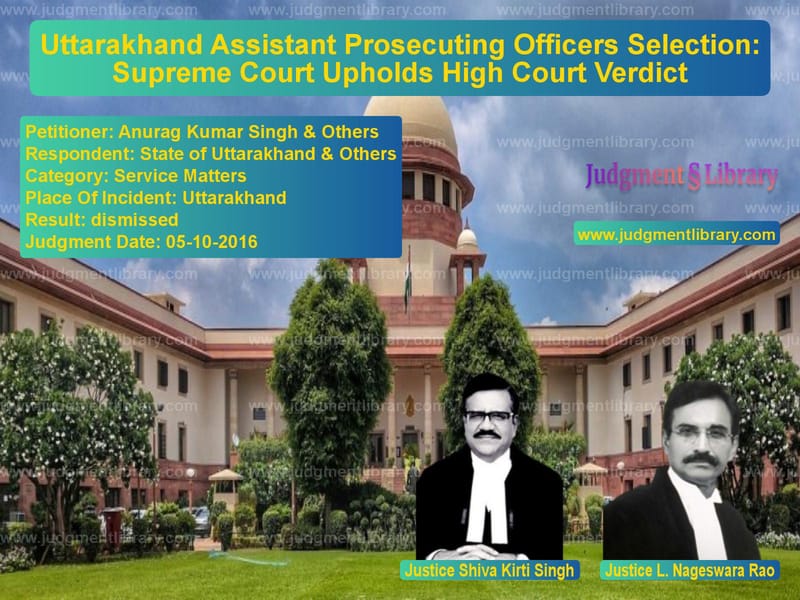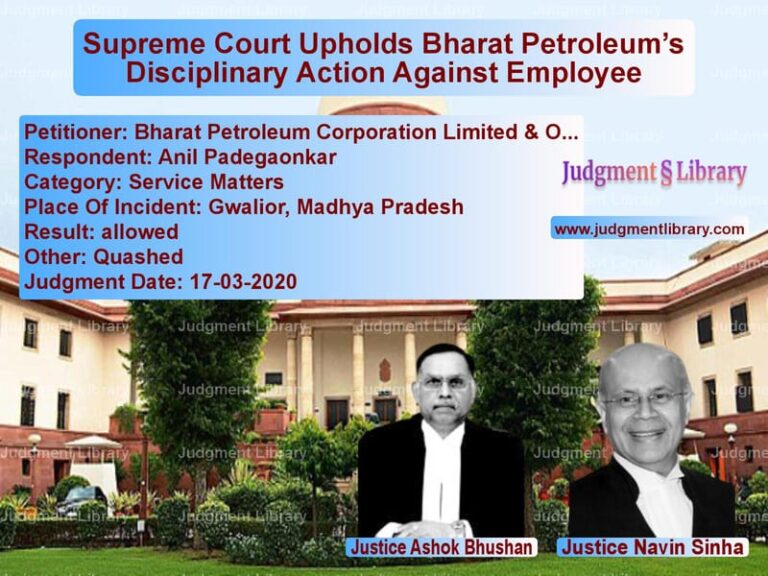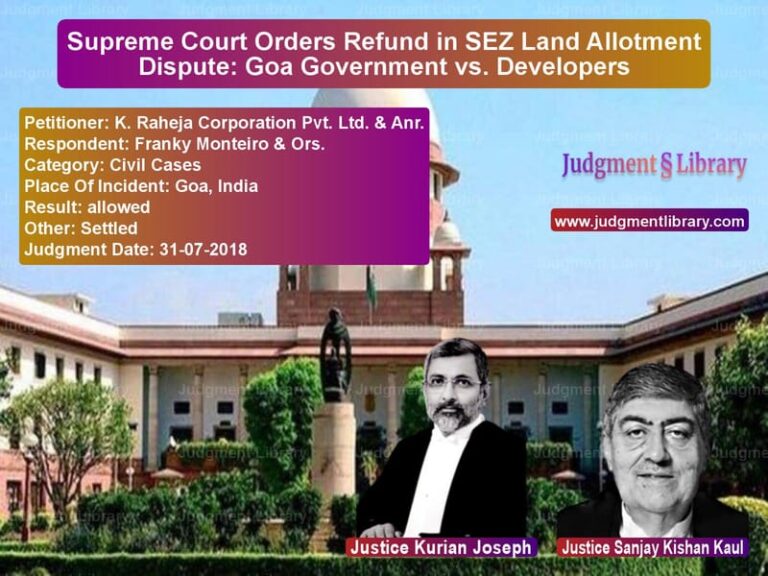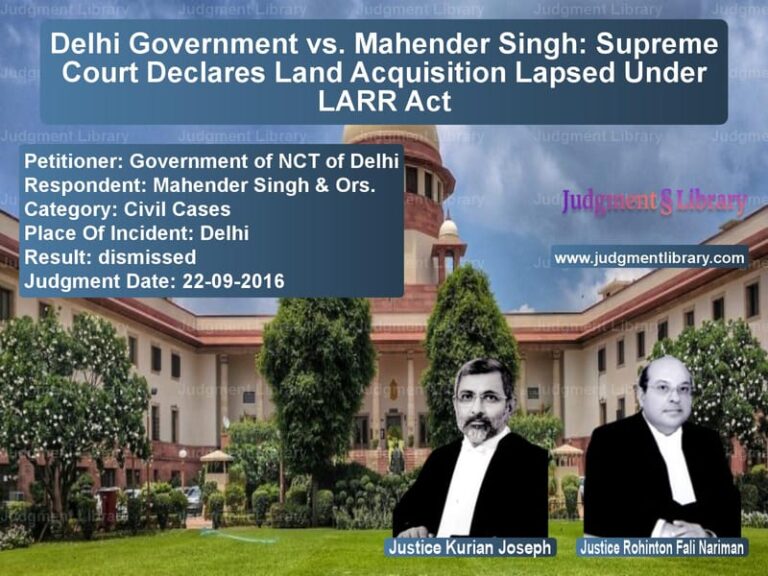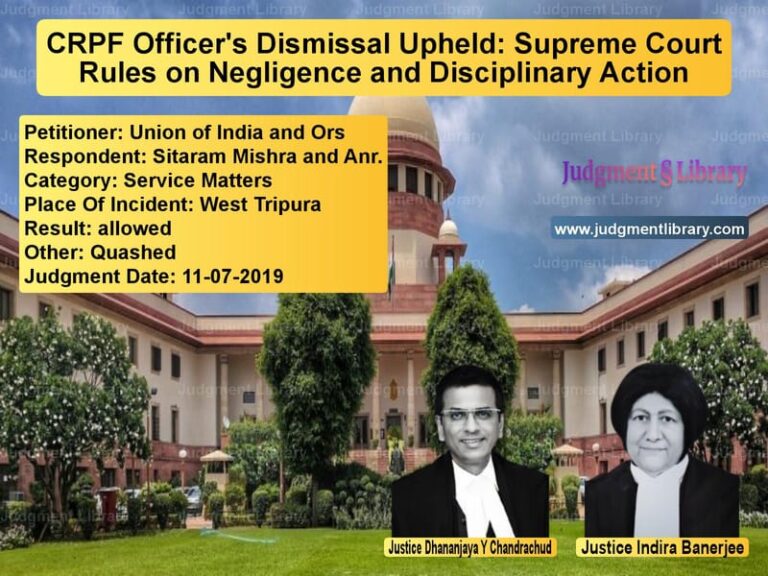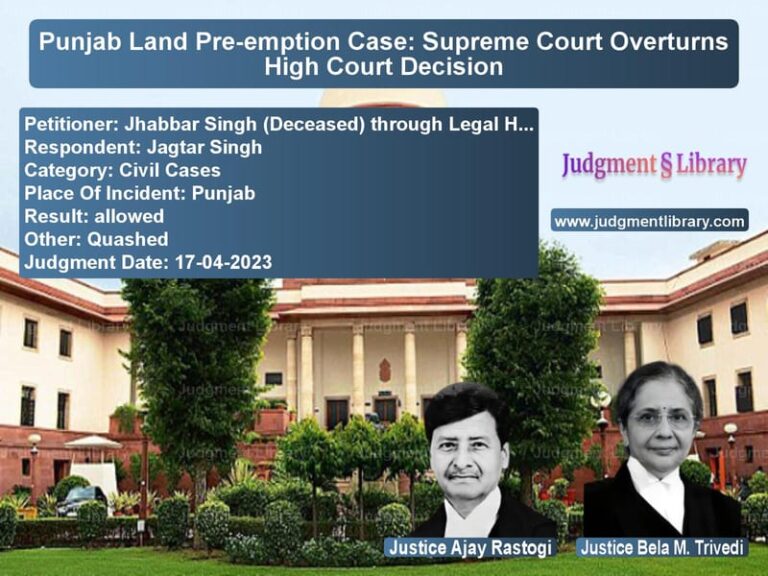Uttarakhand Assistant Prosecuting Officers Selection: Supreme Court Upholds High Court Verdict
The Supreme Court of India, in the case of Anurag Kumar Singh & Others v. State of Uttarakhand & Others, delivered a significant judgment on October 5, 2016, concerning the recruitment process for Assistant Prosecuting Officers in the State of Uttarakhand. The case arose from a recruitment advertisement issued in 2009, where the number of advertised vacancies was later increased. The Court upheld the High Court’s decision restricting appointments to the originally advertised 38 posts and ruled that additional vacancies must be filled through a fresh selection process.
The judgment reaffirms the principle that government recruitment must strictly adhere to advertised vacancies and that future vacancies cannot be filled through the same selection process unless explicitly stated in the advertisement.
Background of the Case
On September 19, 2009, the Uttarakhand Public Service Commission issued an advertisement for the recruitment of 38 Assistant Prosecuting Officers. The advertisement mentioned that the number of vacancies might be increased or decreased by the State Government. Subsequently, 37 additional posts were created, bringing the total number of available positions to 74. However, this increase in posts was not officially incorporated into the ongoing recruitment process.
A preliminary examination was conducted on October 31, 2010, and its results were declared on February 4, 2011. Following this, a candidate filed an application under the Right to Information Act, 2005, seeking clarification on the number of vacancies being filled. The response indicated that the selection was being conducted for 74 posts, despite only 38 posts being originally advertised.
The discrepancy led to a writ petition being filed in the High Court of Uttarakhand, seeking a direction that the selection process be limited to the originally advertised 38 posts.
Arguments Presented
Petitioners’ (Selected Candidates’) Arguments
- The government had already created 37 additional posts before the recruitment process was completed.
- The recruitment advertisement clearly mentioned that the number of vacancies could be increased.
- The shortage of Assistant Prosecuting Officers in Uttarakhand warranted filling all 74 positions to meet administrative requirements.
- The High Court erred in restricting the appointments to only 38 posts, disregarding the acute shortage of personnel.
Respondents’ (State of Uttarakhand) Arguments
- The additional vacancies were not formally included in the recruitment process before the selection process began.
- Recruitment must adhere to the principle that only advertised vacancies can be filled unless explicitly stated otherwise.
- The recruitment year for the selection was from July 1, 2008, to June 30, 2009, and the additional posts were created after this period.
Supreme Court’s Judgment
The Supreme Court upheld the High Court’s ruling, stating that selection could only be made for the originally advertised 38 posts. The key observations made by the Court included:
- On Recruitment Rules: The Court ruled that vacancies arising after the recruitment year (July 1, 2008 – June 30, 2009) could not be included in the ongoing selection process.
- On the Validity of Additional Posts: While recognizing the government’s right to create additional posts, the Court held that these should be filled through a fresh selection process.
- On the Candidates’ Rights: The Court acknowledged the legitimate expectations of candidates who had applied for 74 posts but clarified that statutory rules must prevail over administrative decisions.
The Court stated: “It is a well-accepted principle of service law that only the number of vacancies that are advertised can be filled up. If the advertisement gives liberty to the Government to vary the number of posts, such power cannot be exercised for filling up future vacancies.”
Key Legal Precedents Cited
The Court relied on several judgments related to public employment and recruitment rules:
- Prem Singh & Others v. Haryana State Electricity Board (1996): Held that recruitment should be limited to the number of advertised vacancies unless there is an exceptional policy decision.
- UPSC v. Gaurav Dwivedi (1999): Emphasized that fresh vacancies require a separate recruitment cycle.
- State of Haryana v. Subhash Chander Marwaha (1973): Reiterated that exceeding advertised vacancies without a proper process violates constitutional provisions on public employment.
Impact of the Judgment
The ruling has significant implications for government recruitment policies:
- Ensuring Transparency in Recruitment: The judgment reinforces that only advertised vacancies should be filled to maintain fairness in public employment.
- Preventing Administrative Overreach: The ruling prevents the government from arbitrarily modifying vacancy numbers post-advertisement.
- Upholding Constitutional Principles: By adhering to Articles 14 and 16 of the Constitution, the decision ensures equal opportunity for all candidates.
Conclusion
The Supreme Court’s judgment in Anurag Kumar Singh & Others v. State of Uttarakhand underscores the principle that recruitment processes must strictly adhere to advertised vacancies. While recognizing the government’s right to create additional posts, the Court emphasized that such positions must be filled through fresh recruitment cycles.
This decision serves as a precedent for future recruitment cases, ensuring that public employment remains fair, transparent, and compliant with constitutional principles. The ruling also highlights the importance of clearly defining recruitment policies to avoid disputes and litigation in the hiring process.
Don’t miss out on the full details! Download the complete judgment in PDF format below and gain valuable insights instantly!
Download Judgment: Anurag Kumar Singh & vs State of Uttarakhand Supreme Court of India Judgment Dated 05-10-2016.pdf
Direct Downlaod Judgment: Direct downlaod this Judgment
See all petitions in Recruitment Policies
See all petitions in Public Sector Employees
See all petitions in Employment Disputes
See all petitions in Judgment by Shiva Kirti Singh
See all petitions in Judgment by L. Nageswara Rao
See all petitions in dismissed
See all petitions in supreme court of India judgments October 2016
See all petitions in 2016 judgments
See all posts in Service Matters Category
See all allowed petitions in Service Matters Category
See all Dismissed petitions in Service Matters Category
See all partially allowed petitions in Service Matters Category

